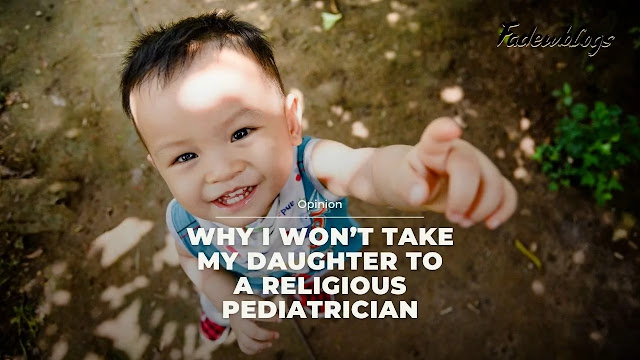Taking Your Child To A Religious Pediatrician
I would never be in favor of banning religion in this country, and I am in favor of allowing hundreds of thousands of Muslim refugees into the U.S.So it’s extremely important to me as a new father that my daughter learn to love all people from all backgrounds.
I am an atheist and a liberal with liberal friends and relatives, so any mention of religion in terms of life decisions is often a toxic subject open to accusations of bigotry and xenophobia.
But religion, despite being a crucial part of the identities of many people, is also a decision. And I believe that it is fair, under some circumstances, to judge someone.
I would never refuse to be friends with someone because of their religion or refuse to attend a restaurant because of the owner’s faith, but I do judge presidential candidates in part based on their religious beliefs, since those views may affect their policy decisions.
I prefer that science professors not be people of faith, but people who adhere strictly to the scientific method—and I certainly don’t want my doctors to be religious.
Liberals often make the mistake of viewing religion in the same vein as race: you are born with it, and it is unchangeable.
But this, of course, is not the case. If you are okay with accepting things on faith, it says something about how you think, and it is a reflection of your analytical abilities.
When my wife was pregnant, we started off with an obstetrician who made us very uncomfortable when she talked about “God’s plan,” so we found a new one.
Then, after my daughter was born, she started to lose weight, so we took her to the pediatrician. On the day of the appointment, the doctor came in wearing a yarmulke.
Having come from a Jewish family and having many Jewish friends, I certainly have nothing against the Jewish people.
But the yarmulke definitely made me feel uncomfortable. How can I trust this man to make the best decisions for my daughter when he believes that he has to keep his head covered from a mythical man in the sky?
This is not to say that I think I know more than a doctor simply because he wears a yarmulke. I respect his medical opinions, and I am, of course, a strong advocate of education and licensing standards. But I need a doctor to be, at the very least, skeptical of faith.
At our request, we saw a different doctor on the follow-up visit and immediately asked if she was religious. She was taken aback and seemed somewhat offended by the question, but she did admit that she was.
We decided to look for a new practice, and we found another group nearby that had no trouble stating affirmatively that their doctors were not religious, and they were fine with my asking—as they should be.
I’m not going down a slippery slope; I’m not planning to ask about their political views or get their credit scores.
But religion is fair game when it comes to the medical field because religion and science are enemies.
One of the pediatricians at the original practice claimed that religion and science can coexist because they do not interfere with each other. I don’t buy it.
If you rely on the scientific method to make life-or-death decisions, you should, at the very least, cast a skeptical eye on religion.
Just as I wouldn’t entrust my money to a banker who thinks that twenty bucks can buy a Rolex, I’m not going to trust my daughter to a doctor who believes in superstitions.
Our new pediatrician does something I like a lot: he questions things. His questioning led to the testing of our daughter’s stool and the discovery of her milk allergy.
He recommended that my wife abstains from eating dairy if she was going to breastfeed and that we incorporate formula into the baby’s diet.
We immediately saw a reversal: our daughter began gaining weight and started sleeping better. Today, she is an overall happier baby who just had her first birthday.
History is full of lessons about why we have laws and institutions that protect religious freedom and freedom of expression.
Yet those lessons do not require us to pretend that superstitions presented as religious beliefs are just as valid as logic and reason.
━━━━━━━━━━━━━━━━━━━━━━━━━━━━━━━━━━━━━━━━━━━━━━━━━━━
A historian, educator, and political pundit who has written for numerous websites and publications, including The Hill, the NY Daily News, Newsday, Newsweek, and The Dictionary of American History. He is also vice president of Long Island Atheists. His fantasy novel for middle-grade students, The Stolen Kingdom, is a free download on Kindle.


